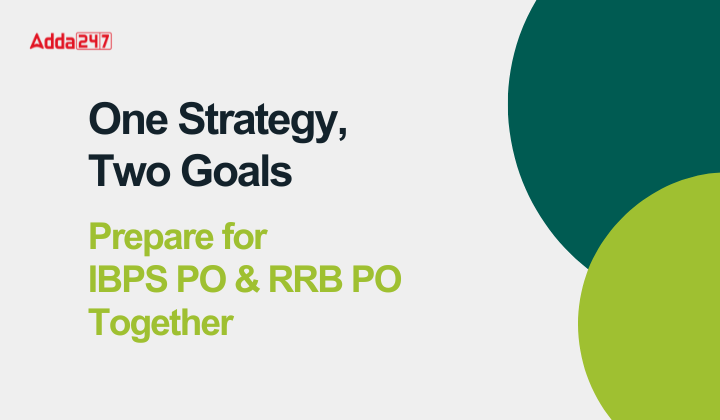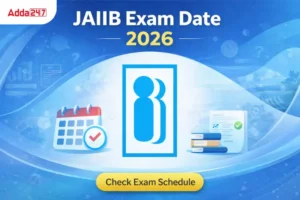Preparing for competitive exams like IBPS PO and RRB PO simultaneously can be both smart and efficient. Despite being conducted by the same body IBPS both exams share a common structure in their prelims and mains stages, especially in sections like Quantitative Aptitude, Reasoning, and English. A unified preparation approach saves time and enhances your chances of cracking both exams also with consistent effort and a well-aligned strategy.
One Strategy, Two Goals: IBPS PO & RRB PO Combined Preparation
The IBPS PO Exam 2025 & RRB Exams have different job profiles and slightly different syllabus, the overlap in core topics provides a golden opportunity for double success. A single, focused strategy designed to cover shared topics as well as individual-specific areas can help candidates aim for two coveted positions through a well-planned effort. Here is a strategy to achieve both goals:
1. Common Ground & Key Differences
When preparing for both IBPS PO and IBPS RRB PO, understanding the common ground and key differences between the two exams is essential. While they share several subjects and question types, certain elements like exam difficulty, language options, and specific paper formats set them apart.
Common Subjects (Prelims & Mains)
- Reasoning Ability: Puzzles, Seating Arrangements (circular, linear, etc.), Syllogism, Inequalities, Coding-Decoding, Blood Relations, Direction Sense, Alpha-Numeric-Symbol Series, Data Sufficiency.
- Quantitative Aptitude/Numerical Ability: Simplification & Approximation, Number Series, Data Interpretation (various types of graphs and charts), Quadratic Equations, Arithmetic topics (Profit & Loss, SI & CI, Time & Work, Time & Distance, Ratio & Proportion, Percentage, Averages, Partnership, Probability, Permutation & Combination, Mensuration).
- English Language (IBPS PO & RRB PO Mains): Reading Comprehension, Cloze Test, Spotting Errors, Para Jumbles, Fill in the Blanks, Sentence Improvement, Vocabulary (Synonyms, Antonyms).
Mains Specific Common Subjects
- General Awareness: Current Affairs (last 6-8 months), Banking & Financial Awareness (RBI functions, banking terms, government schemes, financial reforms), Static GK (countries, capitals, currencies, national parks, etc.).
- Computer Knowledge: Fundamentals of Computer, MS Office (Word, Excel, PowerPoint), Internet Basics, Networking, Shortcut Keys, History of Computers, Security Tools.
Key Differences
- IBPS PO: Generally considered slightly more competitive with a higher difficulty level, especially in Mains. It includes a Descriptive English paper in Mains (Essay & Letter Writing).
- RRB PO: Often has a regional language option (Hindi in addition to English) in the Mains exam. The Computer Knowledge section sometimes carries less weightage than in IBPS PO. The level of difficulty might be slightly lower than IBPS PO, especially in Prelims.
2. Integrated Study Plan
Your study plan should prioritize topics common to both exams first, then incorporate the specific elements.
Phase 1: Foundation Building (Approx. 1.5 – 2 months)
- Concept Clarity: Dedicate enough time to really understand the basic concepts of Reasoning and Quant. Don’t just memorize formulas; understand their application. Use reliable books and online resources. You can start with Reasoning with basic puzzles, syllogisms, inequalities and then move to Quant to master the basics of simplification, approximation, number series, quadratic equations and all arithmetic topics. Focus on calculation speed.
- Daily Practice: Solve 10-15 questions per topic daily for easy topics and 15-20 for difficult ones.
- English Basics: Focus on grammar rules, vocabulary building (daily newspaper reading, especially editorials), and basic reading comprehension.
- Current Affairs: Start reading a daily newspaper and a monthly current affairs compilation. Make short notes.
Phase 2: Intensive Study & Preparation for Main Exam
- Advanced Topics: Move to higher-level puzzles and DI sets in Reasoning and Quant. Practice caselet DI, radar DI, and complex arithmetic problems.
- General Awareness: Take deep drive in banking and financial awareness. Cover static GK extensively. Revise current affairs regularly.
- Computer Knowledge: Cover all fundamental computer topics. Practice multiple-choice questions.
- English (Mains Specific): Start practicing descriptive writing (essay and letter). Focus on structure, comprehension and grammar.
- Sectional Tests: Begin taking topic-wise and sectional tests to identify your strengths and weaknesses in each subject. Analyze your performance meticulously.
Phase 3: Intensive Practice & Revision
- Mock Tests (Prelims): Take full-length Prelims mock tests for both IBPS PO and RRB PO. Analyze each mock test thoroughly:
- Identify questions you got wrong and why.
- Note down questions you skipped or took too long to solve.
- Refine your time management strategy for each section.
- Speed & Accuracy: Work on improving both. Use timed practice sessions for individual sections.
- Revision: Consolidate all concepts, formulas, and important notes. Focus on high-scoring topics.
- Current Affairs: Intensify your current affairs revision for the last 4-6 months.
Phase 4: After Prelims
- Shift Focus to Mains: Once Prelims are over, dedicate almost all your time to Mains-level preparation.
- Higher-Level Mocks: Start taking full-length Mains mock tests for both exams. The questions will be more complex and analytical.
- Descriptive Writing (IBPS PO): Consistent practice of essay and letter writing. Get them evaluated if possible.
- Financial & Banking Awareness: Deep dive into this section, as it’s crucial for Mains.
- Interview Preparation: Start reading about common interview questions, banking roles, and current economic scenarios.
3. Key Preparation Tips for Both Exams
- Prioritize High-Weightage Topics: Based on previous year’s papers, identify and focus more on topics that carry higher weightage. For example, puzzles and DI are crucial.
- Time Management: Develop a robust time management strategy for each section to attempt maximum questions with accuracy.
- Mock Test Analysis is King: Simply taking mock tests isn’t enough. Dedicate significant time (at least equal to the test duration) to analyzing your performance. This is where you learn and improve.
- Previous Year Papers: Solve previous year’s question papers for both exams to understand the difficulty level and typical question types.
- Strong Basics: Never skip the fundamentals. A strong conceptual foundation will help you tackle complex problems.
- Keep Practice: Consistent practice is non-negotiable. The more you practice, the faster and more accurate you become.
- Note Making: Create concise notes for formulas, shortcuts, grammar rules, and current affairs. This aids in quick revision.
- Stay Updated: Regularly read newspapers, banking magazines, and online current affairs platforms.
- Health and Well-being: Don’t neglect your physical and mental health. Take breaks, eat well, and get enough sleep to avoid burnout.
- Identify Weak Areas: Be honest about your weaknesses and dedicate extra time to improve them. Don’t shy away from difficult topics.
- Accuracy over Attempts: Focus on accuracy first, then gradually build up your speed. High accuracy with fewer attempts is better than many attempts with low accuracy due to negative marking.
| Related Post | |
| IBPS PO Syllabus | IBPS RRB PO Syllabus |
| IBPS PO Salary | IBPS RRB PO Salary |
| IBPS PO Cut Off | IBPS RRB PO Cut Off |
| IBPS PO Exam Date | IBPS RRB Previous Year Papers |




 JAIIB Syllabus & Exam Pattern 2026, ...
JAIIB Syllabus & Exam Pattern 2026, ...
 JAIIB Exam Date 2026 Out for May & N...
JAIIB Exam Date 2026 Out for May & N...
 Nainital Bank PO Result 2026 Out @nainit...
Nainital Bank PO Result 2026 Out @nainit...








